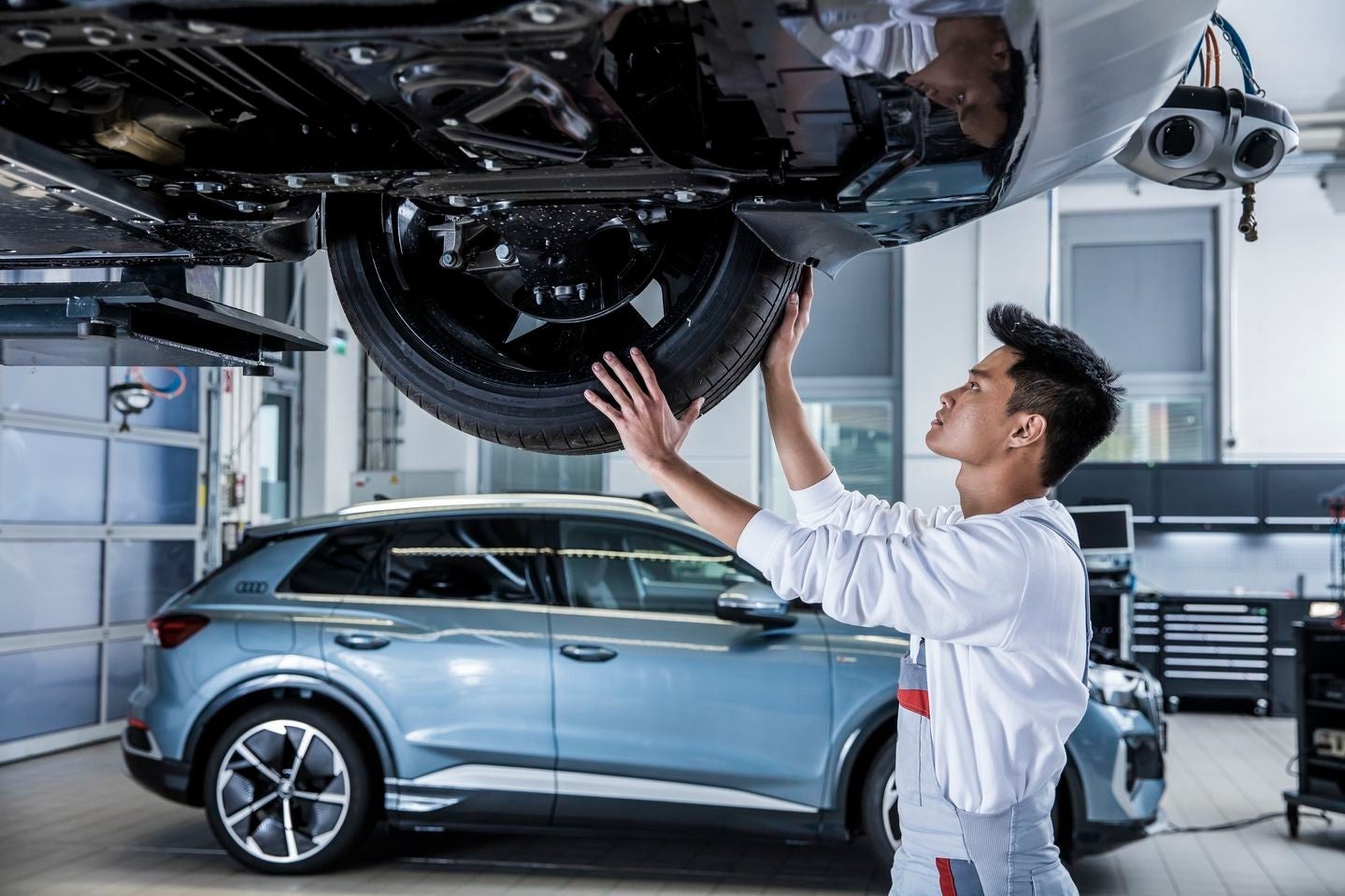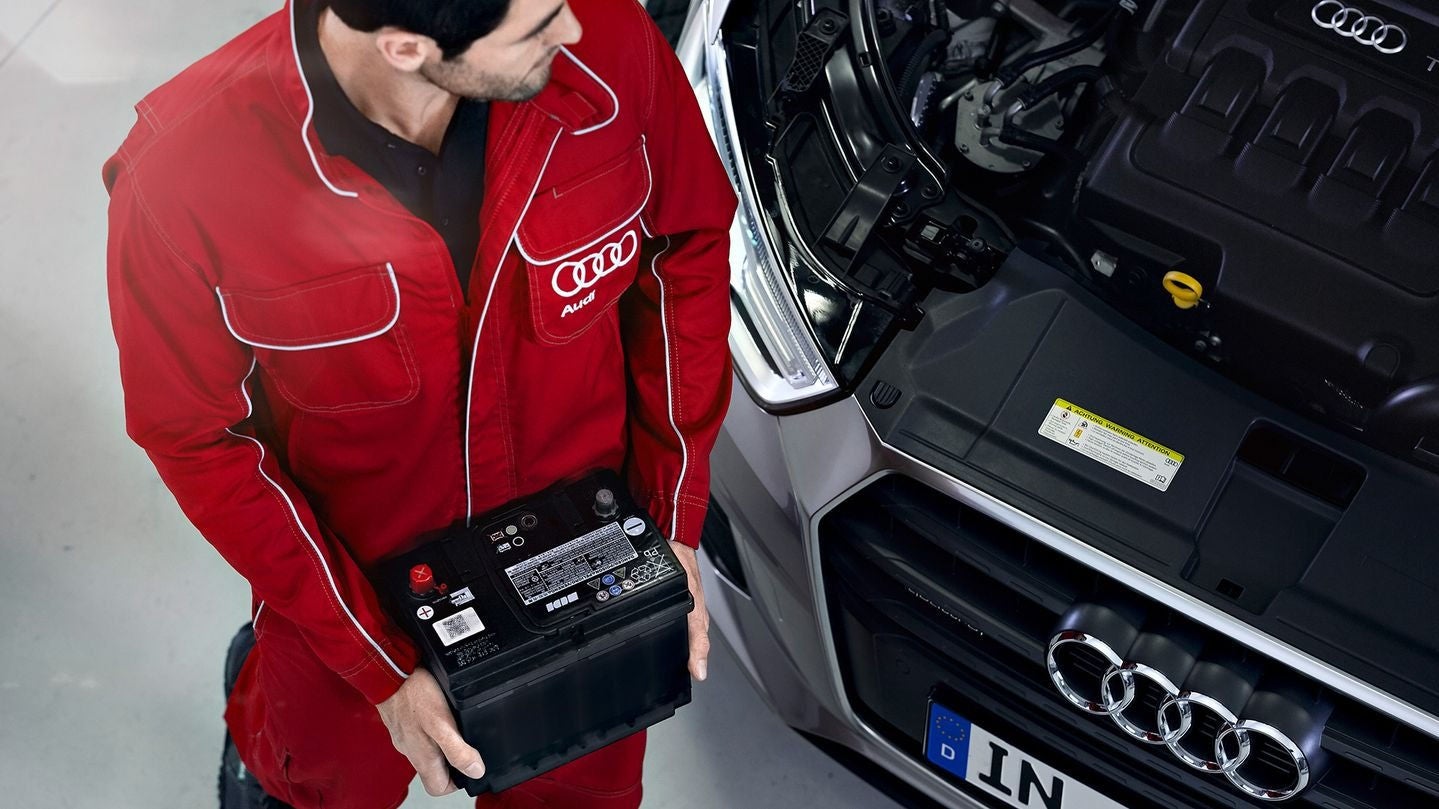
Returns & recycling
Here, you will find everything you need to know about returning end-of-life vehicles, returning electrical/electronic equipment and returning batteries. We will be happy to help you with any questions you may have on the topic. Please contact your Audi partner using the form.
Returning end-of-life vehicles
The brochure "Returning and recycling end-of-life vehicles" offers you a wealth of information. We will be happy to help you with any questions you may have on the topic. Please contact your Audi partner using the form or the free hotline.
Legal requirements
The last owner can return their old Audi for recycling free of charge via our return points if the following conditions are met:
- The vehicle was last registered in the European Union for at least one month before it was permanently decommissioned.
- The vehicle is complete (delivery condition) with no essential parts missing, such as the drive, body, chassis, catalytic converter or electronic control units for vehicle functions.
- The vehicle is free of things that do not belong to the vehicle, e.g., waste.
- The manufacturer of the vehicle is AUDI AG.
- The vehicle registration document or a comparable EU registration document is returned together with the vehicle.

Returning electrical and electronic equipment
Here, you will find everything you need to know about returning electrical and electronic equipment. We will be happy to help you with any questions you may have on the topic. Please contact your Audi partner using the form.
Waste electrical and electronic equipment must be properly disposed of and recycled at the end of its life. It is not only the manufacturers and distributors, but also you as the end user who are obliged by law to ensure disposal. Proper returns help protect the environment and conserve resources.
You can recognise electrical and electronic equipment by the marking with the crossed-out waste bin symbol. Electrical and electronic equipment with this marking must be collected and disposed of separately from normal household waste in accordance with legal requirements. Contained batteries or accumulators that are not permanently installed must be removed beforehand in a non-destructive manner and disposed of separately as batteries.
You can return waste electrical and electronic equipment free of charge to local waste disposal companies, public collection points and the following distributors: distributors with a sales area for electrical and electronic equipment of more than 400 m² and grocery stores with a total sales area of more than 800 m². In the case of selling by means of distance communication, the area thresholds relate to the storage and dispatch areas. Only in the case of waste electrical and electronic equipment measuring more than 25 cm at the side may returns at the above-mentioned distributors be made dependent on the purchase of a comparable device. Also pay attention to the instructions and information of the distributor or waste disposal company in question. Addresses of official collection points for returning waste electrical and electronic equipment for free can be obtained from your local or city administration.
You are responsible for deleting any personal data stored on the devices.

Returning batteries
Here, you will find everything you need to know about returning batteries. We will be happy to help you with any questions you may have on the topic. Please contact your Audi partner using the form.
Audi vehicles or individual Audi Genuine Parts contain batteries, e.g., the high-voltage traction battery, the starter battery or commercially available device batteries.
As an end user, you are legally obliged to dispose of batteries correctly, as indicated by the printed crossed-out waste bin. This means that you are obliged to collect and dispose of batteries separately from normal household waste.
You can return batteries to your Audi company or specialist company free of charge. In the case of commercially available batteries, these can also be returned to the trade businesses that distribute them.
Handling lithium (Li) batteries requires special care, e.g., they must not be strongly heated or damaged. Batteries containing heavy metals are labelled with the chemical symbols Cd (cadmium), Hg (mercury) and Pb (lead), provided that these heavy metals are present in concentrations above the relevant limit values. Battery components can damage human and animal health and accumulate in the environment. To avoid these consequences, it is essential to ensure separate collection and proper return.
It is often possible to prepare waste batteries, by means of mere testing, cleaning or repair, such that they can be reused for the same purpose for which they were originally intended without further pretreatment. A high-voltage traction battery can still be used outside the vehicle even after years of use in the vehicle. This so-called second-life use saves important resources and protects the environment. You can contribute to this by returning your end-of-life vehicle to a certified collection point for end-of-life vehicles, so that the battery is dismantled properly without damage being caused. If the battery needs to be replaced, your Audi partner will take care of the disposal of the used battery.
In addition to the possibility of reuse, you can help prevent the generation of waste and littering in the environment by, for example, examining the possibilities of repairing your device before proper disposal.


